Galleries
10 Unmissable Works at Art Basel Unlimited 2016
This edition is bigger and more political than ever.
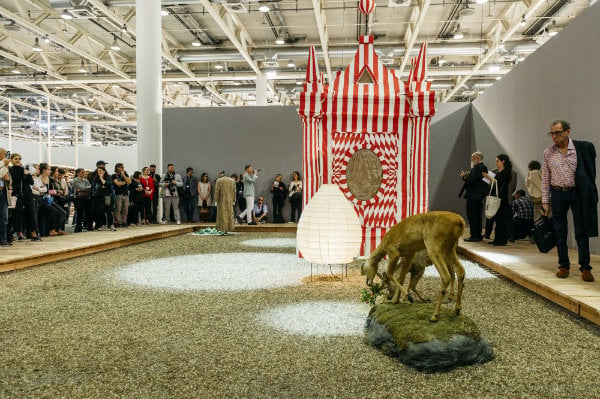
This edition is bigger and more political than ever.

Hili Perlson

Art Basel Unlimited, the sector dedicated to artworks too large for a fair booth, opened its doors to a throng of collectors and art world denizens on a rainy Monday night. Curated by Gianni Jetzer, curator at large for the Hirshhorn Museum and Sculpture Garden, Washington. D.C., this edition of Unlimited was the largest ever, with some 88 monumental art works making the huge hangar feel particularly crowded.
The sector brings both historical as well as newer works to the fair, including high-profile names like Anish Kapoor, Ai Weiwei, James Rosenquist, and Christo. But this year, there were a lot of performances taking place across the 16,000 square meters of space, and whoever happened to be in the audience was either tipped off by the gallerists, or just happened to be at the right place at the right time.
Unlimited’s special idiosyncrasy lies in its careful balance between presentations that offer grand-scale divertissement—not to mention #artselfie opportunities—and ones that address difficult issues headlong, with this year’s edition, opening a day after the devastating mass shooting at a gay nightclub in Orlando, Florida, feeling more political than ever.
Here are the 10 unmissable works at Unlimited:
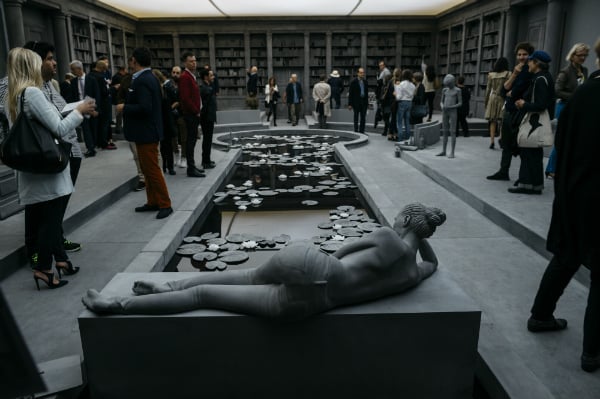
Hans Op de Beeck, The Collector’s House (2016). Courtesy of Marianne Boesky Gallery, Galleria Continua, and Galerie Krinzinger, Art Basel Unlimited, 2016.
1. Hans Op de Beeck, The Collector’s House (2016)
Entering the monochromatic charcoal room, the viewer is overcome with the pleasure of the beauty of the titular collector’s house—complete with an elegant pond running along it—and the sense that whoever may have lived among the many tasteful artifacts has perished gruesomely, the charcoal coating hinting at some modern-day Pompeii.
2. Samson Young, Canon (2015)
While this work by the young Hong Kong artist may be one you shouldn’t miss, it is indeed rather easy to overlook. Atop a booth-sized cube, Young performs in police uniform with the sonic weapon used to disperse crowds at demonstrations, which is called the Long Range Acoustic Device (LRAD). At maximum volume, it can induce permanent hearing damage. However, the technology is also used to repel birds from private properties, and Young performed a series of distressed bird calls to a mesmerized audience.
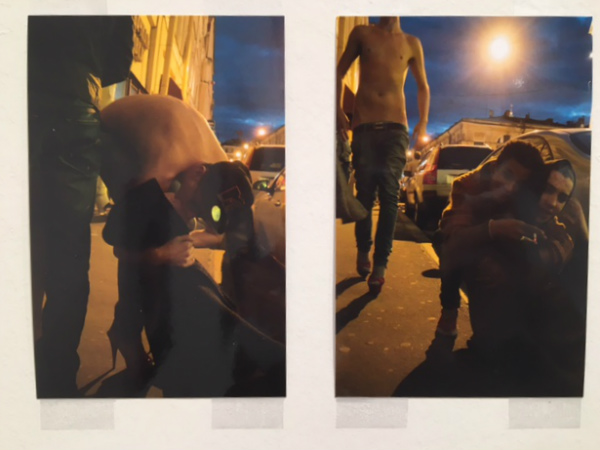
Detail from Wolfgang Tillmans, New York Installation PCR, 525 (2015), at Art Basel Unlimited 2016. Photo courtesy of Hili Perlson
3. Wolfgang Tillmans, New York Installation PCR, 525 (2015)
Following the horrific news of the shooting at the Pulse nightclub in Orlando, a Wolfgang Tillmans image of two men kissing, which was posted by hundreds on their social media feeds, became a symbol of solidarity and defiance in the face of terror. Here at Unlimited, Tillmans has mounted a presentation similar to his recent show “PCR” at David Zwirner gallery, which mixes editorial work and photography featuring activists around the world. His series of gay couples in Russia, shot for I-D magazine, feels particularly poignant in light of Sunday’s massacre.
4. Kahlil Joseph, m.A.A.d. (2014)
Kahlil Joseph’s split-screen video is a portrait of Compton, California, which captures everyday moments in predominantly black neighborhoods suffused with joy and sadness. The dense and booming soundtrack by Kendrick Lamar adds another layer to this prismatic account, which blends amateur footage, magic realism, and music video tropes.
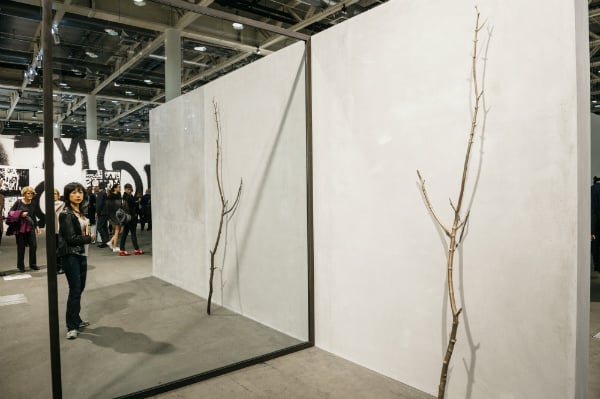
Alicja Kwade, Out of Ousia (2016). Courtesy of 303 Gallery, König Galerie, kamel mennour, Art Basel Unlimited 2016.
5. Alicja Kwade, Out of Ousia (2016)
Presenting a new work, Alicja Kwade creates a confounding environment that challenges optical perception. A concrete wall, divided by a double-sided mirror, and a glass wall create four sections in which objects like a branch or a rock are placed. It is hard to distinguish whether the objects are reflected on either side of the glass, or if they exist doubly, as Kwade created exact copies cast in steel and positioned them on other side. A huge audience circulated the construction all throughout the opening hours.

AA Bronson, Folly, audio component by Ebe Oke. Courtesy of Esther Schipper, Art Basel Unlimited 2016.
6. AA Bronson, Folly (2015)
Bronson, who has integrated spirituality and shamanism into his art, presented a “queered” Zen garden filled with fetish objects ranging from Chinese antiques to kitschy, life-size deer figures. The lure of the red-and-white-striped tent is hard to resist, especially in the crowded opening: cushioned with plush fabrics, it suggests withdrawal and contemplation. Around 5 p.m., musician Ebe Oke performed on the wooden deck that surrounds the garden, chanting a pining circular tune.
7. Louise Lawler, Helms Amendment (1989)
Among the most striking political works on view at Unlimited is Lawler’s piece reacting to a 1987 US Senate vote in favor of legislation that stipulated that “none of the funds made available under this Act to the Centers for Disease Control shall be used to provide AIDS education, information, or prevention materials and activities that promote or encourage, directly or indirectly, homosexual sexual activity.”
The chilling text appears on the wall repeatedly, in red and blue, once for each senator who voted for it. The walls are filled with 94 black-and-white photographs of plastic cups, and each states the name of one of the 94 senators who voted in favor. Two voted nay, and four did not vote.
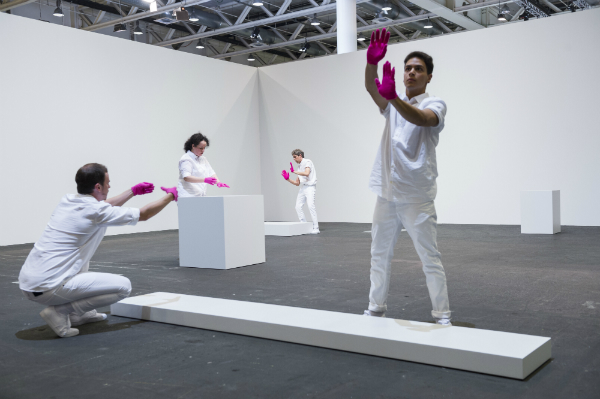
Davide Balula, Mimed Sculptures (2016). Courtesy of Gagosian Gallery, galerie frank elbaz, Art Basel Unlimited 2016.
8. Davide Balula, Mimed Sculptures (2016)
A group of performers clad in white uniform save for their hot pink gloves (which reminded me of the pink-legged dog from Pierre Huyghe’s Documenta 13 work) move around plinths of various sizes. They gesticulate, miming the outlines of sculptures such as Giacometti’s Le-nez (1947), Eva Hesse’s Hang up (1966), Louise Bourgeois’ Unconscious Landscape (1967-8), and more. It’s like a game of art history charades, but beyond the appeal of trying to recognize the mimed sculpture, the performance also conjures a new, sensual relation to these works as the performers air-caress their details.
9. Ariel Schlesinger, Two Good Reasons (2015)
There are quite a few kinetic sculptures on view at Unlimited this year, but during the opening hours, none attracted a larger crowd than Ariel Schlesinger’s white sheets of polypropylene, which moved towards each other on the floor until they touched, and started to rise. The piece is exemplary of Schlesinger’s practice, in which he animates lifeless objects using as much levity and wit as he does engineering and inventiveness. Expect this work to appear all over your Instagram feed.
10. Mike Kelley, Reconstructed history (1989)
This series of 50 drawings by Kelley is not for the faint-hearted. Using pages out of old schoolbooks, Kelley added profanities and lewd scribbles to the found images. But beyond the juvenile gesture of a bored school kid, these hard-hitting doodles and notations effect a rethinking of how history is conveyed in images that in themselves are filled with information about the era in which they were created.